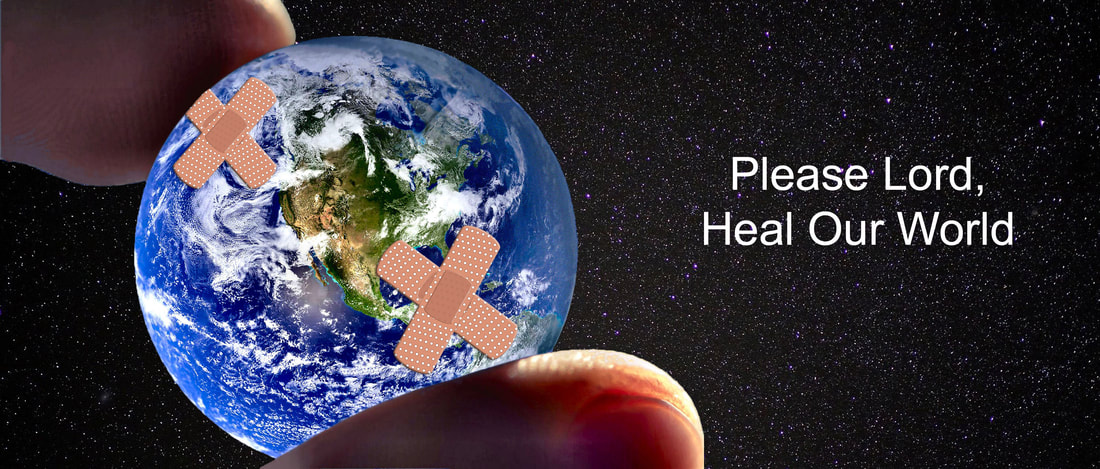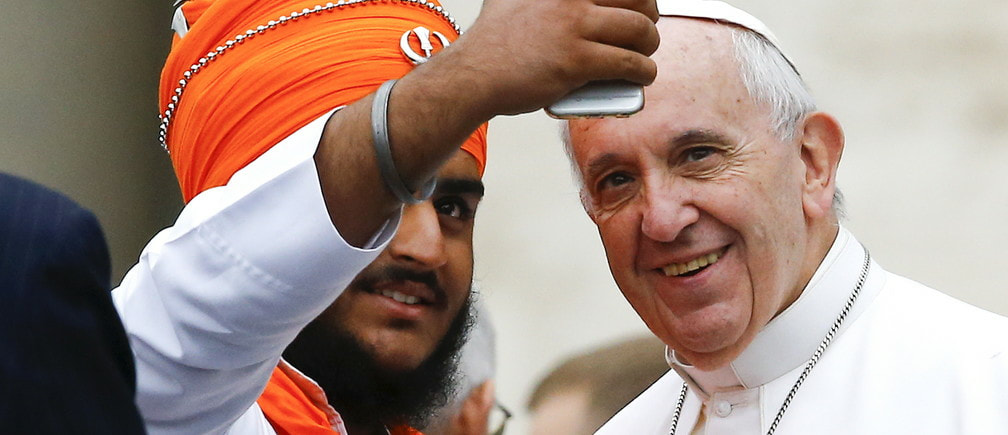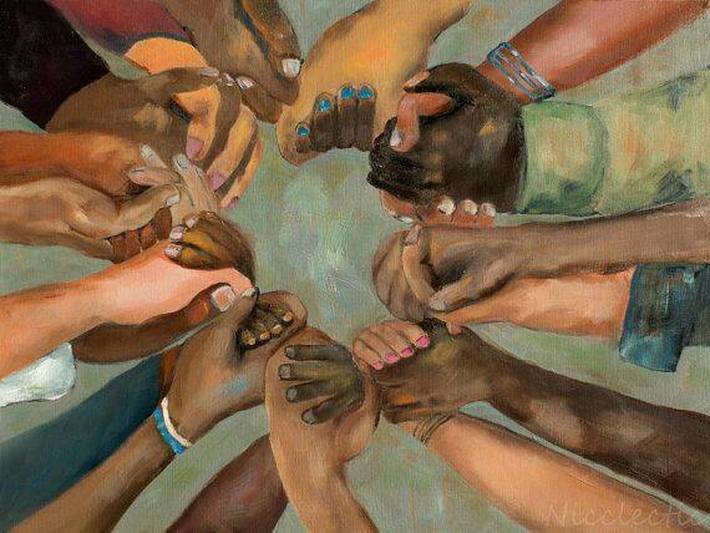|
(A sermon in January 2021)
Politically, we are paralyzed by bitter partisanship. Economically, millions are out of work. Internationally, our reputation is in shambles. Four hundred thousand people have died of COVID already. Our nation is broken and needs healing (Psalms 60:2-5). God promised Solomon: “if my people, who are called by my name, will humble themselves and pray and seek my face and turn from their wicked ways, then I will hear from heaven, and I will forgive their sin and will heal their land.” 2 Chronicles 7:14. This promise is also applicable to Christians today. First, as Christians we must humble ourselves. Our worst problem is often pride; we assume ourselves self-sufficient and fail to recognize our need for God (James 4:6). We should judge ourselves critically, lest we come under God’s judgment (1 Corinthians 11:31, 1 Peter 4:17). Also, we should not judge others because we are also sinful (James 4:12, Romans 2:3). Second, we must stop complaining, start praying (Hosea 7:14), and not give up (Luke 18:1). Be sincere in our prayer (Colossians 4:2, Ephesians 6:18). Be specific with our requests and keep track of God’s answers, so that our faith might grow. Third, we should seek God earnestly (Hebrews 11:6). We spend too much time and effort seeking other things than God (Psalms 14:2-3), when He should be our highest priority and our passion. When we seek Him first, everything we need will be given to us (Deuteronomy 4:29-31, Matthew 6:32-33). Lastly, turn from our mistakes and turn to God completely. We and our culture are loaded down by all sorts of sins (2 Timothy 3:2-5). We often see others’ mistakes as we remain blind to our own (1 John 1:8). We should repent, confess our sins to each other, and pray for each other, so that we may be healed and refreshed (James 5:16, Acts 3:19). If we do the above, God promises He will hear our prayer, forgive our sins, and heal our nation (2 Chronicles 7:14). Change starts in us. Be humble. Judge ourselves critically. Keep praying. Seek God earnestly and repent. Place our hope in our only Savior, Jesus Christ. Summary of the Rick Warren sermon. https://www.youtube.com/watch?v=hZpnMLFl-fY. 上帝如何医治破碎的国家 2021年1月的讲道 在政治上,党派之间苦毒的争斗使我们陷于瘫痪。 在经济上,数百万人加入了失业的大军。 在国际上,我们的声誉变得一团糟糕。此外,已有40万人死于新冠病毒。这个破碎的国家需要医治 (诗篇60:2-5)。 上帝曾应许所罗门: “這稱為我名下的子民,若是自卑,禱告,尋求我的面,轉離他們的惡行,我必從天上垂聽,赦免他們的罪,醫治他們的地。” (历代志下7:14) 这个应许也适用于今天的基督徒。 首先,谦卑自己。最严重的问题是骄傲,以为能自给自足,不需要上帝的供应(雅各书4:6)。应该严格地自我反省, 免受上帝的审判(哥林多前书11:31,彼得前书4:17)。也不要论断他人,因为自己也同样犯罪(雅各书4:12,罗马书2:3)。 第二,停止抱怨,开始祷告 (何西阿书7:14)。 不断禱告,不可灰心 (路加福音18:1)。祷告要真诚(歌罗西书4:2,以弗所书6:18),要具体,要逐一记下上帝的回答,让信心不断增长。 第三,诚恳地寻求上帝 (希伯来书11:6)。我们花费许多的时间和精力,去寻求其它事物,而不是上帝。祂本应是我们最高的优先,激情的所在 (诗篇14:2-3)。如果先寻求祂,所需的一切都会加给我们 (申命记4:29-31, 马太福音6:32-33)。 最后,完全转离错误, 转向上帝。我们和我们的文化被各种罪恶压倒 (提摩太后书3:2-5)。 我们常常只看到他人的错误,对自己的却视而无睹(约翰壹书1:8)。当悔改,互相认罪,彼此代祷,使我们可以得到医治, 焕然一新 (雅各书5:16, 使徒行传3:19)。 如果做到以上这些,上帝应许聆听我们的祷告,宽恕我们的罪过,治愈我们的国家 (历代志上7:14)。 改变从自己开始。要谦卑,严格地自我反省;不断祈祷;诚恳地寻求上帝并悔改;将盼望寄托在唯一的救主耶稣基督里。
0 Comments
Christianity is antithetical to racism.
Every person, no matter their race, is made in the image of God. God’s blessing through Abraham is to all peoples (Gen 12:3). The blessing has been realized through Christ, who sacrificed and died for all of us. Christ accepted all sorts of people—prostitutes, lepers, disabled, tax collectors, and Samaritans. The Israelites hated the Samaritans, but Christ befriended them. John 4:4 described Christ insisted on going through Samaria, though there were other paths. That trip depicted Christ having the longest conversation recorded in the Bible, and it was with a Samaritan woman. Later, He stayed with the Samaritans for two days (John 4:40). Other examples include Christ healing a Samaritan leper, and one of His most memorable parables featured a good Samaritan (Luke 17:11-19, Luke 10:25-37). Such behaviors irked the Jews to no end, causing some to even consider Him a Samaritan (John 8:48). The early church did not separate Jews from Gentiles, or the uneducated (e.g., the Scythian) from the educated (Galatians 3:28, Colossians 3:11). As to genetic differences based on skin color, they are in the 0.01 percent range. Genetic variations within a race are much higher than variations among different races. In the US, slaves were initially Scots, Irishman, Englishmen, and others. Later, kidnapping people from Africa as slaves became a big business. One reason was because African slaves were much easier to track down if they ran away. Once here, they were isolated, oppressed, denied equal rights, and stripped of numerous opportunities. Those who would discriminate based on skin color are driven by power and greed. It is a way to justify suppression and exploitation. Christ tears down walls and facilitate reconciliation (2 Corinthians 5:16-19). Christ humbled Himself to become human and die for us (Philippians 2:5-8). He used His privilege for us. Paul followed Christ and gave up his privilege as a Roman to spread the gospel to Gentiles. We also should follow Christ and use our privilege to help those in need. Fight racism with love. Instead of suppressing those different from us, include them and help them if they need it. Racism is a spiritual battle. Ask God to strengthen us to win it. Summarized from a John Ortberg sermon https://menlo.church/mountainview/series/use-your-privilege#/modal/message/6847/mlo_mv 使用您的特权 基督教反对种族歧视。 各族人民都是按照上帝的形象被造。 上帝通过亚伯拉罕赐福所有人 (创世纪12:3)。 这赐福已经通过基督得以实现。 祂献上自己为祭,为每一个人死在十字架上。 基督接纳各种各样的人 - 妓女,麻风病人,残疾人,税吏和撒玛利亚人。 以色列人厌恶撒玛利亚人,但基督却与他们为友。 约翰福音4:4描述虽然还有其它途径可行,基督仍然坚持经过撒玛利亚。在那次旅程中祂与一个撒玛利亚妇人进行了圣经记载中最长的对话。后来,祂甚至在撒玛利亚住了两天 (约翰福音4:40)。其它例子包括医治撒玛利亚的麻风病人和给律法师讲解撒玛利亚人的比喻,后者是基督最令人难忘的比喻之一 (路加福音17:11-19; 10:25-37)。 这些行为大大地激怒当时的犹太人,以至有些人甚至把祂当作撒玛利亚人看待 (约翰福音8:48)。 早期的教会并没有将犹太人与外邦人分开,也没有将未受过教育的人(野蛮人,Scythian)与受过教育的人分开 (加拉太书3:28;歌罗西书3:11)。 不同肤色的遗传差异,其范围只在0.01%以内。 一个种族中的遗传变异远高于不同种族之间的变异。 在美国,最初的奴隶有苏格兰人,爱尔兰人和英国人等。后来,绑架非洲人作为奴隶成了大生意。原因之一是非洲奴隶逃跑后更容易被追踪。他们一到美国,就被孤立,被压迫,被剥夺平等权利, 被剥夺了许多机会。 正是权力和贪婪的驱动才根据肤色对人进行分类,歧视某些肤色的人,给压制和剥削提供“正当”的理由。 基督拆毁了隔断人的墙,促进人与人之间的和好(哥林多后书5:16-19)。 基督谦卑自己,成为与我们一样的人,为我们受死 (腓立比书2:5-8)。 祂使用祂的特权来拯救我们。 保罗跟随基督,放弃了罗马人的特权,将福音传给外邦人。 我们也应该跟随基督,使用我们的特权去帮助有需要的人。 让我们用爱来对抗种族主义。不要压制与自己不同的人。 相反地,接纳他们,在他们有需要时提供帮助。 与种族主义的争战是一场属灵的斗争。 求上帝赐力量给我们,让我们取得胜利。 In claiming absolute truth and adhering to a standard of morality, does Christianity pose a threat to freedom? Could Christians live in peace with those they believe to be condemned by God? Are Christians intolerant to atheists or even other Christians of different denominations?
Some Christians liken being intolerant to going through the narrow gate to God (Matthew7:13-14). But others consider such people as narrow-minded, irrational bigots. American culture has become increasingly divisive. Many, including some evangelical Christians, find it difficult even to talk to those with opposing views, like Muslims, atheists, Mormons, or LGBTQ persons. Tolerance and accepting absolute truth are not mutually exclusive. Christ claimed absolute truth. He claimed to be the way to eternal life (John17:3), and that no one could come to the Father except through Him (John14:6-7). Yet, Christ was breathtakingly tolerant. He allowed a prostitute to wash His feet with her hair; He commended a hated Roman centurion; He partied with despised tax collectors; and He healed Samaritan lepers alike (Luke17:16). One of the longest conversations recorded in the New Testament was between Christ and a pagan, promiscuous, female Samaritan (John4:7-26). The narrow gate is the path of following Christ. We learn from Him how to live; we put Him above all else; and we understand His teachings as we obey Him joyfully (Matthew 7:13-14). Following Christ gives us freedom (John8:31-32), but real freedom requires restrictions. For fish to live freely, they need to be restricted to the water. True freedom requires us to stay within certain boundaries. We are made in God’s image. So, we need to follow Christ. Following Christ means being more than tolerant of others. We aren’t called to merely tolerating them, but rather we should love them as ourselves (Matthew 5:44). If we want to be a great violinist or a great football player, we need years of discipline and lessons. To be Christ’s disciples requires no less. This is the narrow gate. Though narrow, Christ will be with us on this path. To conclude, don’t be so sure of ourselves. Be sure of God. Narrow-mindedly devote ourselves to Him, but broad-mindedly accept and love others. Summarized from a John Ortberg’s sermon: https://menlo.church/series/deconstruction#/modal/message/4137/mlo 基督教思想狭窄吗? 基督教主张绝对真理,持守道德标准, 是否因此对自由造成威胁?基督徒可与他们认为被上帝定罪的人和平相处吗?基督徒不容忍无神论者,甚至不容忍其它不同教派的基督徒吗? 有些基督徒把不宽容比作通往上帝的窄门(马太福音7:13-14)。但是,其他人则认为这样的人思想狭窄,毫无理性。 美国文化变得越来越分裂。许多人(包括一些福音派基督徒)认为很难与持不同观点的人交谈,比如穆斯林教派的人,无神论者,摩门教徒,同性恋或跨性别者(LGBTQ)。 然而,宽容和接受绝对真理不是相互排斥的。 基督宣称绝对真理。祂宣告自己是通往永生的道路(约翰福音17:3),除非通过祂没有人可以到父神那里去(约翰福音14:6-7)。 然而,基督却非常地宽容。祂允许妓女用她的头发清洗自己的脚; 赞扬为人所恨的罗马百夫长;与被人鄙视的税吏共席;治愈撒玛利亚的麻风病患者(路加福音17:16)。新约记载中最长的对话之一,就是基督与一个异教淫荡的撒玛利亚妇人的谈论(约翰福音4:7-26)。 窄门通往那条跟随基督的道路:向祂学习如何生活;将祂置于一切之上;并且明白祂的教导,喜乐地顺服祂(马太福音7:13-14)。 跟随基督带来自由(约翰福音8:31-32)。 然而,真正的自由需要限制。鱼儿想自由自在地生活,就必须把自己限制在水里。真正的自由需求有适当的自我约束。我们是按照上帝的形象被造的。因此,我们需要跟随基督。 跟随基督意味着不只是宽容他人。不应该仅仅宽容他们,而是应该像爱自己一样爱他们(马太福音 5:44)。 如果想成为一位杰出的小提琴师或出色的足球运动员,就需要多年的纪律和功课。同样地,成为基督的门徒也需要许多的锻炼。这是一扇窄门。 虽然门是窄的,基督却会在这条道路上与我们同在。 总而言之,不要太过于自信。应当信靠神。专心致志地奉献自己给祂,同时宽容地接纳和爱护他人。 How can people of different races, cultures and religions live together in peace?
In the Old Testament, Jews followed a straight set of dietary laws, treating certain foods as unclean. This practice signified cleanliness before God and helped them maintain their identity apart from surrounding cultures. But after Christ, our cleansing is through Him. Food is neutral, neither clean nor unclean (Romans 14:14). Even so, many early Christians struggled with this change in centuries worth of custom and habits. Early Christians also argued over whether they could eat food blessed by pagan priests. To Paul, such worry showed a weakness in their faith (1 Corinthians 8). Some consider certain paths to be right. They might despise those outside, and consider them as immoral and too liberal, with no courage of conviction. They may even resort to violence to force others to follow. Some think that there is no absolute truth. To them, all roads lead to Rome. They despise those who claim otherwise and consider them narrow-minded, intolerant, and uncivilized. Racial, cultural, and religious differences have created lots of conflicts. Different views from diverse groups could help us see the different aspects of God, but conflicting views can’t all be true. How do we deal with the inherent conflicts? Romans 14 teaches us that we must evaluate to separate right from wrong. But those on the right path should welcome the weak and shouldn’t use arguments to change them (14:1). Instead, we should patiently listen to the other camp and build deep relationships with them, gradually encouraging them to listen to our side. Learn from Christ. He condemns our sin, but He still stepped down from heaven to build deep relationships with us, the sinners. Because of Christ, our status before God is not based on our behavior, but rather on what Christ has done for us. Because of Christ, we know God loves us, and our future in the new heaven and earth is assured. God’s assurance has given us hope and the fortitude to change. We can build deep relationships with those against Him and gradually show them His love. Adapted from a Tim Keller sermon http://www.gospelinlife.com/free-sermon-resource https://gospelinlife.com/downloads/hope-race-and-power-5357/ 不同种族,文化和宗教的人如何和平共处? 在旧约时期,犹太人遵循一系列嚴格的饮食规条,将某些食物视为不洁。这种做法表示在上帝面前洁净自己,并有助于保持他们的身份,与四周的文化分别出来。但在基督之后,我们通过祂得到洁净。食物本身是中性的, 没有干净或不净的分别(罗马书14:14)。然而,改变数百年的习俗和传统是困难的。许多早期的基督徒为此而挣扎。 早期的基督徒也争论是否能吃异教祭司祝福过的食物。对保罗而言,这种担忧表明了他们信仰的软弱(哥林多前书8)。 有些人认为某些道路是正确的,鄙视那些在这些道路以外的人,视之为不道德, 过于自由,对信念没有勇气。他们甚至可能诉诸暴力迫使他人跟从自己。 还有些人认为没有绝对真理,条条大路通罗马,鄙视那些不接受这样看法的人,认为这些人头脑狭窄,不宽容,不文明。 种族,文化和宗教差异造成了许多冲突。来自多样化群体的不同观点可以帮助我们看到上帝不同的层面。但互相矛盾的观点不可能都是真理。如何处理这些内在冲突呢? 罗马书十四章教导我们必须评估对错, 将对与错分开。但是,那些走在正路上的人应该接纳软弱者,不应用争辩来改变他们(罗马书 14:1)。相反地,我们应该耐心地聆听另一方,与其建立深厚的关系, 逐渐地鼓励他们聆听我们的观点。 我们当向向基督学习。 祂谴责我们的罪过,但依然从高天降下, 来到世间,与我们这群罪人建立深厚的关系。 因为基督, 我们在神面前的地位不是基于自己的行为,而是取决于基督为我们所做的事。 因为基督, 我们知道上帝对我们的爱,明白我们在新天新地的未来得到了保证。 上帝的保证带来盼望,带来勇气改变自己。这样就可以与反对上帝的人建立深厚的关系,渐渐地将上帝的爱显明给他们。 Christianity is the counter-culture (1 Peter 2:11). To the general public, many Christian principles are considered radical, including our views on property, sex, family, life after death, and our priorities during our life on earth. Some argue such beliefs could lead to terrorism. But Christ when insulted didn’t retaliate, when suffered made no threat. Instead, He served and died for His enemies. Genuine followers of Christ couldn’t become terrorists. Christ’s disciples didn’t give in to the surrounding culture, nor did they withdraw from it. Holding onto their faith in Christ, they engaged with and served their communities. Though recognizing their good deeds, their society rejected them (1 Peter 2:12). How did the disciples maintain such a balance? First, they recognized Christ as their foundation, the cornerstone they built their life on (1 Peter 2:7). Some people build their foundation on sand, whether it be one’s intellect, physical ability, fame, or beauty—sooner or later all of which will fail them. The disciples built themselves on Christ—the way, the truth and the life (John 14:6). Following Him, they lived joyful and fruitful lives. Second, the disciples knew Christ was on their side. They saw the creator of the heavens and earth, being rejected, suffer, and lay down His life for them. Christ persevered to the end because He loved them and considered them precious. With the almighty God on their side, they didn’t need affirmation from people around them. By trusting in Christ, they would not be put to shame (1 Peter 2:6). Third, the disciples were united with other Christians under Christ, forming a deeply interconnected community that supported each other and built each other up. In conclusion, God loves us, and we are precious to Him. With Christ as our foundation, Christians are deeply united as a body under Christ. Although we are foreigners or aliens to the current culture, where the general public could attack and malign us, we can still engage with and serve our communities. Summarized from a Tim Keller sermon. http://www.gospelinlife.com/free-sermon-resource www.youtube.com/watch?v=uQVhZXBIETo 基督教,以基督为根基的逆主流文化群体
基督教是逆主流文化的(彼得前书2:11)。 对于普通大众而言,许多基督教的原则都被视为激进,包括基督徒对财产,性,家庭,死后的生命以及他们在世生命优先次序的看法。 有些人认为这种信念可能导致恐怖主义。但是基督被骂不还口,受害不说威吓的话。相反地,祂服侍祂的仇敌,为他们而死。真正的基督追随者不会成为恐怖分子。 基督的门徒没有屈服于主流文化,也没有从中撤离出来。他们坚持对基督的信仰,参与社区并为社区服务。尽管当时的社会认识到早期基督徒的善行,它们还是拒绝了他们 (彼得前书2:12)。 基督的门徒如何保持这种平衡呢? 首先,认识基督是根基,是建立生命的基石 (彼得前书2:7)。有些人把根基建立在沙土上,无论是智力、体能、名声还是美貌--所有这些迟早都会令其失望。 门徒以基督为根基来建造自己, 基督是他们的道路, 真理和生命 (约翰福音14:6)。门徒跟随祂,过着喜乐而结果子的生活。 第二,门徒知道基督站在他们这边。他们看到天地的创造者被拒绝,受苦并且为他们舍命。基督至死不移地爱他们, 视他们为珍宝。全能的神站在他们的一边。门徒不需要周围人的接纳和确认。他们因信靠基督而不至于羞愧 (彼得前书2:6)。 第三,门徒在基督之下与其他信徒团结, 成为紧密相连, 相互支持,彼此建立的群体。 总而言之, 上帝爱我们,视我们为珍为宝。以基督为根基, 基督徒在祂之下团结一致。虽然主流文化将我们视为客旅或寄居的,虽然我们可能受到众人攻击和诽谤,我们依然参与和服侍我们的社区。 |
Categories
All
|
Proudly powered by Weebly




